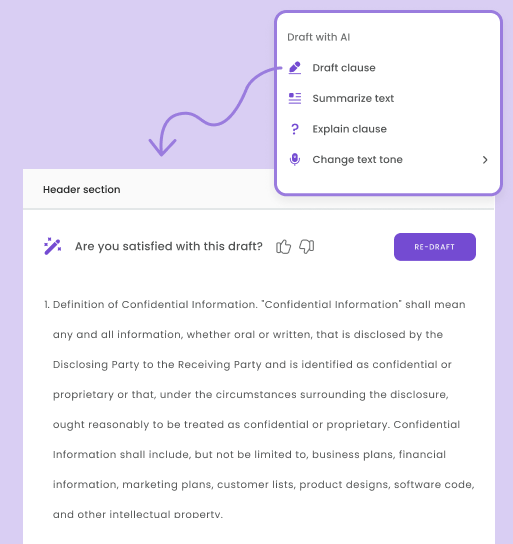Not every contractual relationship is built on a definite outcome. Sometimes, a specific event will trigger the obligation of one or more parties. This is known as an aleatory contract and is more common than you may realize. In fact, almost every business participates in aleatory contracts in one way or another.
In this guide, you’ll get a deeper understanding of what aleatory contracts are, when they should be used, and the benefits they bring to the table.
Understanding Aleatory Contracts
Aleatory contracts are agreements in which the performance or outcome is uncertain and depends on an uncertain event or contingency. In these contracts, one party’s obligation to perform is triggered by the occurrence of a specific event that may or may not happen.
- Conditional Nature: Aleatory contracts are highly conditional. They are often based on the principle of “chance” or “luck.” The obligations of the parties are contingent upon the uncertain event taking place. For example, in a gambling contract, one party may win money if a specific outcome occurs.
- Risk and Reward: Aleatory contracts involve a significant element of risk and reward. Depending on the outcome of the uncertain event, one party may receive a substantial benefit while the other may incur a loss. This risk-reward dynamic is a defining characteristic of aleatory contracts.
Types of Aleatory Contracts:
- Insurance Contracts: Insurance contracts are one of the most common forms of aleatory contracts. In an insurance agreement, the insured pays premiums to the insurer in exchange for coverage against specific risks or contingencies, such as accidents, illness, or property damage. The insurer’s obligation to pay out benefits is triggered by the occurrence of the insured event, which may or may not happen.
- Gambling Contracts: Gambling contracts are another classic example of aleatory contracts. In gambling, individuals place bets or wagers on uncertain events, such as the outcome of a sporting event or the roll of a dice. The payoff or loss depends on the outcome of the event, making it a clear illustration of aleatory nature.
- Derivative Contracts: Derivative contracts, including options and futures contracts, are also aleatory in nature. These financial instruments derive their value from an underlying asset or index. The parties involved speculate on the future value of the underlying asset, and the contract’s performance depends on the asset’s price movement. Depending on the outcome, one party may gain, while the other may suffer a loss.
Legal Framework for Aleatory Contracts:
- Enforceability: The enforceability of aleatory contracts can vary by jurisdiction. In many legal systems, aleatory contracts are generally enforceable as long as they meet other contract formation requirements, such as offer, acceptance, and consideration. However, contracts that involve illegal activities, such as certain types of gambling, may not be enforceable.
- Regulatory Oversight: Some types of aleatory contracts, particularly insurance and derivatives, often fall under regulatory oversight to protect the interests of the parties involved and ensure fair practices. Regulatory agencies may set rules, licensing requirements, and financial standards for these contracts.
- Common Legal Issues: Legal issues related to aleatory contracts can include disputes over the interpretation of contract terms, allegations of fraud or misrepresentation, and questions about the validity of the underlying events. For example, in insurance contracts, disputes may arise over whether a particular event qualifies for coverage, while in gambling contracts, issues related to cheating or unfair play may be contentious.
In summary, aleatory contracts are characterized by their reliance on uncertain events, and their enforceability and regulation can vary depending on the type of contract and the legal jurisdiction in question. Parties entering into such contracts should be aware of the risks and legal considerations associated with them.
Historical Context of aleatory contracts
The origins of aleatory contracts can be traced back to ancient civilizations where people engaged in various forms of betting, gambling, and insurance-like arrangements. Here’s a brief overview:
- Ancient Civilizations: Aleatory contracts have roots in ancient societies. For example, in ancient Rome, there were contracts called “stipulatio ludicra,” which were wagers or bets made on the outcome of events like chariot races or gladiator contests. These contracts embodied the fundamental aleatory concept of uncertain outcomes.
- Marine Insurance: The concept of marine insurance, another form of aleatory contract, has ancient origins as well. Phoenician and Greek traders engaged in informal risk-sharing arrangements to protect their goods during sea voyages. These arrangements laid the groundwork for modern marine insurance.
Early Uses and Development:
Aleatory contracts evolved and gained prominence through historical developments and societal needs:
- Medieval Europe: During the Middle Ages, as trade and commerce expanded, so did the need for risk mitigation. In response, marine insurance contracts became more formalized. In the 14th century, the Statute of Beaulieu in England recognized the legality of marine insurance contracts, providing a legal framework for this type of aleatory agreement.
- Renaissance Italy: Italian merchants in cities like Florence and Venice played a significant role in developing early forms of insurance. They established the first insurance guilds, which provided a forum for individuals to pool risks and losses.
Key Historical Examples:
- Lloyd’s of London: Lloyd’s of London, founded in the late 17th century, is one of the most famous historical examples of an institution specializing in aleatory contracts. It began as a coffeehouse where shipowners and merchants gathered to discuss and underwrite insurance contracts for maritime ventures. Over time, it grew into a global insurance market known for insuring a wide range of risks, from ships to unique items like celebrity body parts.
- The Great Fire of London (1666): The Great Fire of London led to significant insurance claims. The fire prompted insurance companies to revisit and refine their contracts, highlighting the importance of precise contract language and risk assessment. This event also contributed to the growth of insurance as a vital industry.
- Chicago Board of Trade (CBOT): In the United States, the Chicago Board of Trade, founded in 1848, played a pivotal role in the development of derivative contracts, particularly futures contracts. These financial instruments allowed agricultural producers to hedge against price fluctuations, offering a prime example of aleatory contracts applied to financial markets.
Aleatory contracts have a rich historical context, with their origins dating back to ancient civilizations. They evolved in response to the need for risk management in trade, leading to the development of insurance and derivative contracts. Notable institutions like Lloyd’s of London and events like the Great Fire of London played essential roles in shaping the landscape of aleatory contracts and modern risk management practices.
Aleatory Contracts in Practice
Insurance Contracts:
- How Insurance Works as an Aleatory Contract:
- In an insurance contract, the insured pays regular premiums to the insurer.
- The insurer agrees to provide coverage and financial protection against specific risks or events, such as accidents, illness, property damage, or loss.
- The insured event, which is uncertain and often undesirable (e.g., a car accident or a house fire), triggers the insurer’s obligation to pay out benefits.
- The insured party may receive compensation that exceeds the total premiums paid over time, or they may receive nothing if the insured event never occurs.
- Examples of Insurance Aleatory Clauses:
- Life Insurance: A common example is a life insurance policy where the insured pays premiums, and in the event of their death, the beneficiary receives a death benefit. If the insured individual lives beyond the policy term, the premiums paid are not refunded.
- Property Insurance: In property insurance, if a homeowner pays premiums for coverage against fire damage, the insurer only pays out if a fire actually occurs. If no fire happens, the premiums are retained by the insurer.
- Health Insurance: Health insurance policies work similarly. The insured pays premiums, and the insurer covers medical expenses in the event of illness or injury.
Gambling Contracts:
- Casino Games and Betting:
- Casino games, such as roulette, blackjack, and slot machines, are classic examples of gambling contracts.
- Players place bets on uncertain outcomes, such as the roll of dice or the order of cards in a deck.
- The casino sets the odds, and players accept the risk that they may win or lose their wagers based on the unpredictable results.
- Sports Betting and Aleatory Elements:
- Sports betting involves wagering on the outcomes of sporting events.
- Bettors place bets on specific events like the winner of a football game or the total number of points scored.
- The outcome is entirely uncertain, and bettors stand to either win money or lose their wagers based on the results of the event.
Derivative Contracts:
- Financial Derivatives and Speculation:
- Derivative contracts, such as futures and options, are financial instruments that derive their value from an underlying asset, index, or reference rate.
- Traders speculate on the future price movement of the underlying asset.
- Derivatives are aleatory because their payoff depends on the uncertain future price of the asset.
- For example, in a futures contract on oil, the buyer and seller agree to exchange oil at a specified future date and price. The profit or loss depends on the actual future market price of oil.
- Investment Risks and Rewards:
- Investors use derivatives for risk management and speculative purposes.
- While they offer opportunities for significant gains, they also carry substantial risks.
- For instance, a trader who purchases call options on a stock may benefit if the stock price rises, but they can lose the entire premium paid if the stock price falls or remains stagnant.
In all these examples, aleatory contracts involve a degree of uncertainty, chance, and risk. Parties involved are aware that they may either gain or lose based on unpredictable events or outcomes, which is a fundamental characteristic of aleatory contracts.
Advantages and Disadvantages of aleatory contracts
Aleatory contracts are agreements where the performance or outcome is contingent upon an uncertain event, such as a game of chance, natural disaster, or some other unpredictable occurrence. These contracts have their advantages and disadvantages:
Advantages of Aleatory Contracts:
- Risk Management: Aleatory contracts can be useful for managing and transferring risk. Parties involved in these contracts can use them to protect themselves from financial losses in the face of unpredictable events. For example, insurance contracts are a common form of aleatory contracts, allowing individuals or businesses to protect themselves from potential future losses due to accidents, illness, or other unexpected events.
- Investment Opportunities: Some aleatory contracts, such as options and derivatives, offer investment opportunities. These contracts allow investors to speculate on price movements or fluctuations in various financial markets. While these investments come with risk, they can also provide opportunities for profit if predictions are accurate.
Disadvantages of Aleatory Contracts:
- Moral and Ethical Concerns: Aleatory contracts can sometimes be seen as morally or ethically problematic. Critics argue that they can encourage gambling behaviors and excessive risk-taking. For example, some types of financial derivatives played a role in the 2008 financial crisis, leading to concerns about their impact on the broader economy.
- Potential for Exploitation: In some cases, one party to an aleatory contract may have more information or power than the other, leading to the potential for exploitation. For example, in gambling, the house (casino) typically has an advantage over individual players, which can result in players losing significant amounts of money. Similarly, in financial markets, sophisticated investors may take advantage of less experienced ones through complex derivatives or speculative trading strategies.
It’s important to note that the perception of aleatory contracts can vary widely depending on the context and specific type of contract involved. While they offer benefits like risk management and investment opportunities, they also raise concerns about ethics and exploitation. Parties entering into aleatory contracts should carefully consider their motivations and the potential consequences before proceeding.
Legal Considerations
Legal considerations are crucial when it comes to aleatory contracts. These contracts often involve significant financial stakes and the potential for disputes. Here are some legal aspects to consider:
Enforceability and Validity:
- Meeting Contractual Requirements: Aleatory contracts must meet the basic requirements of contract law to be enforceable. These include offer, acceptance, consideration, legal purpose, and the capacity of the parties. If any of these elements are lacking, the contract may not be valid or enforceable.
- Unconscionability: Courts may review aleatory contracts for unconscionability, which refers to contracts that are so one-sided or oppressive that they are deemed unfair. If a court finds a contract to be unconscionable, it may render some or all of its provisions unenforceable.
- Statutory and Regulatory Requirements: Some types of aleatory contracts, such as insurance contracts, are subject to specific statutory and regulatory requirements. Parties entering into these contracts must comply with these laws and regulations to ensure the contract’s validity and enforceability.
Regulatory Oversight and Compliance:
- Licensing and Regulation: Certain industries that frequently use aleatory contracts, like insurance and gambling, are heavily regulated. Businesses operating in these sectors must obtain licenses and comply with specific regulations to legally offer these contracts. Failure to do so can result in fines, penalties, and even criminal charges.
- Consumer Protection: In many jurisdictions, there are laws and regulations in place to protect consumers entering into aleatory contracts. These laws may require clear and transparent disclosures, prohibit unfair practices, and provide mechanisms for resolving disputes.
- Market Oversight: Financial markets where aleatory contracts are traded, such as derivatives markets, often have regulatory authorities overseeing their activities. These authorities establish rules and standards to ensure market integrity and protect investors.
Legal Precedents:
- Legal Precedents: Courts often rely on previous legal decisions (precedents) when resolving disputes related to aleatory contracts. Understanding how similar cases have been decided can provide insights into potential outcomes.
- Dispute Resolution: Aleatory contracts can lead to disputes when an uncertain event occurs or when there are disagreements about contract terms. Understanding how past disputes were resolved can inform parties about potential strategies for resolving their own conflicts.
- Contract Review: Parties should consider seeking legal advice before entering into aleatory contracts, especially if they are complex or involve significant sums of money. Legal experts can review the contract terms to ensure compliance with applicable laws and regulations and help parties understand their rights and obligations.
In conclusion, legal considerations play a vital role in the enforceability, validity, and compliance of aleatory contracts. Parties involved in these contracts should be aware of the legal requirements and potential regulatory oversight in their specific industry or jurisdiction to ensure that their contracts are legally sound and do not lead to legal disputes or penalties. Additionally, staying informed about legal precedents and seeking legal advice when necessary can be valuable in managing legal risks associated with aleatory contracts.
Conclusion
Aleatory contracts, in many cases, are required when doing business or purchasing certain types of assets (such as residential property). Even if they’re not required, they can serve an important purpose in protecting your interests.
This guide has gone through what an aleatory contract is, how they’re used, advantages, disadvantages, and everything in between. Now, it’s up to you whether or not you need them.
Let me know what you think in the comments and don’t forget to share.




